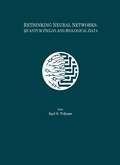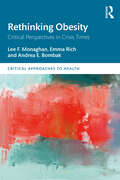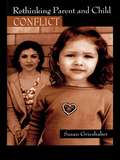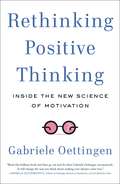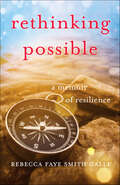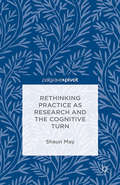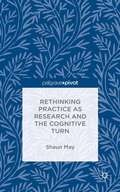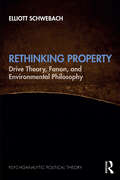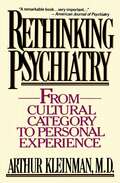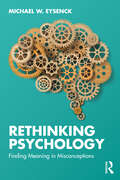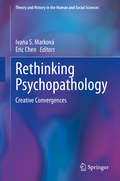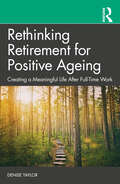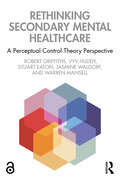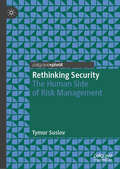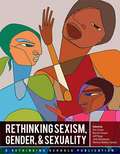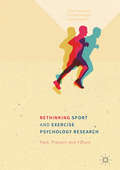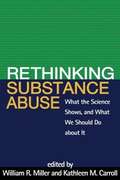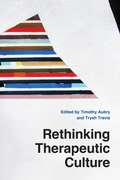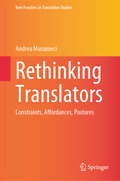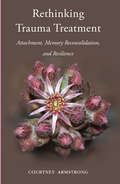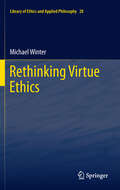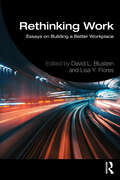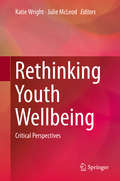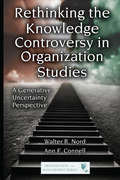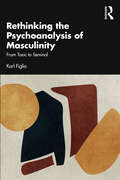- Table View
- List View
Rethinking Neural Networks: Quantum Fields and Biological Data (INNS Series of Texts, Monographs, and Proceedings Series)
by John Eccles Karl H. PribramThe result of the first Appalachian Conference on neurodynamics, this volume focuses on processing in biological neural networks. How do brain processes become organized during decision making? That is, what are the neural antecedents that determine which course of action is to be pursued? Half of the contributions deal with modelling synapto-dendritic and neural ultrastructural processes; the remainder, with laboratory research findings, often cast in terms of the models. The interchanges at the conference and the ensuing publication also provide a foundation for further meetings. These will address how processes in different brain systems, coactive with the neural residues of experience and with sensory input, determine decisions.
Rethinking Obesity: Critical Perspectives in Crisis Times (Critical Approaches to Health)
by Emma Rich Lee F. Monaghan Andrea E. BombakTheoretically informed and empirically grounded, Rethinking Obesity invites readers to reconsider the medical and public health framing of population weight (gain) as a massive global problem, epidemic or crisis. Attentive to social values, scientific uncertainty and possible harms, the book furthers critique of the weight-centred health paradigm and world war on obesity. Building upon existing international literature from critical weight studies, fat studies and critical obesity research, the book advances scholarship with reference to body politics and health policy, epidemiology and obesity science, media reporting and weight-related stigma. The authors resist the common moralised narrative that ‘the overweight majority’ are lazy, gluttonous, and personally responsible for their actual or potential ills and the solution ultimately necessitates individual lifestyle change. Critique is also extended to seemingly compassionate public health interventions that putatively avoid victim-blaming through an appeal to ‘the obesogenic environment’, a consequence of modern living. Empirical case studies are grounded in women’s repeated and often frustrating experiences of dieting and schoolgirls’ encounters with fat pedagogy, which challenges dominant obesity discourse. Recognising that declared public health crises may become layered and cascade through society, this book also includes timely research on the COVID-19 pandemic response amidst concerns about lockdown weight-gain, heightened risk of infection and death among people deemed overweight and obese. Rethinking Obesity interrogates how social injustice is reproduced not only through cruelty but also through seemingly benevolent representations, pedagogies and policies. Alternative approaches and action, ranging from weight-inclusive health paradigms to broader social change, are also considered when seeking to foster collective hope in crisis times. This is valuable reading for students and researchers in medical sociology, social and population health sciences, physical education, critical weight and fat studies, and the social dimensions of the body.
Rethinking Parent and Child Conflict (Changing Images of Early Childhood)
by Susan GrieshaberThe book draws from Foucault's notion of power-knowledge-resistance and feminist poststructuralism to offer a re-theorization of parent-child conflict.
Rethinking Positive Thinking
by Gabriele Oettingen"The solution isn't to do away with dreaming and positive thinking. Rather, it's making the most of our fantasies by brushing them up against the very thing most of us are taught to ignore or diminish: the obstacles that stand in our way."So often in our day-to-day lives we're inundated with advice to "think positively." From pop music to political speeches to commercials, the general message is the same: look on the bright side, be optimistic in the face of adversity, and focus on your dreams. And whether we're trying to motivate ourselves to lose weight, snag a promotion at work, or run a marathon, we're told time and time again that focusing on fulfilling our wishes will make them come true.Gabriele Oettingen draws on more than twenty years of research in the science of human motivation to reveal why the conventional wisdom falls short. The obstacles that we think prevent us from realizing our deepest wishes can actually lead to their fulfillment. Starry-eyed dreaming isn't all it's cracked up to be, and as it turns out, dreamers are not often doers.While optimism can help us alleviate immediate suffering and persevere in challenging times, merely dreaming about the future actually makes people more frustrated and unhappy over the long term and less likely to achieve their goals. In fact, the pleasure we gain from positive fantasies allows us to fulfill our wishes virtually, sapping our energy to perform the hard work of meeting challenges and achieving goals in real life.Based on her groundbreaking research and large-scale scientific studies, Oettingen introduces a new way to visualize the future, called mental contrasting. It combines focusing on our dreams with visualizing the obstacles that stand in our way. By experiencing our dreams in our minds and facing reality we can address our fears, make concrete plans, and gain energy to take action.In Rethinking Positive Thinking, Oettingen applies mental contrasting to three key areas of personal change-- becoming healthier, nurturing personal and professional relationships, and performing better at work. She introduces readers to the key phases of mental contrasting using a proven four-step process called WOOP--Wish, Outcome, Obstacle, Plan--and offers advice and exercises on how to best apply this method to daily life. Through mental contrasting, people in Oettingen's studies have become significantly more motivated to quit smoking, lose weight, get better grades, sustain fulfilling relationships, and negotiate more effectively in business situations.Whether you are unhappy and struggling with serious problems or you just want to improve, discover, and explore new opportunities, this book will deepen your ideas about human motivation and help you boldly chart a new path ahead.
Rethinking Possible: A Memoir of Resilience
by Rebecca Faye GalliBecky Galli was born into a family that valued the power of having a plan. With a pastor father and a stay-at-home mother, her 1960s southern upbringing was bucolic—even enviable. But when her brother, only seventeen, died in a waterskiing accident, the slow unraveling of her perfect family began. Though grief overwhelmed the family, twenty-year-old Galli forged onward with her life plans—marriage, career, and raising a family of her own—one she hoped would be as idyllic as the family she once knew. But life had less than ideal plans in store. There was her son’s degenerative, undiagnosed disease and subsequent death; followed by her daughter’s autism diagnosis; her separation; and then, nine days after the divorce was final, the onset of the transverse myelitis that would leave Galli paralyzed from the waist down. Despite such unspeakable tragedy, Galli maintained her belief in family, in faith, in loving unconditionally, and in learning to not only accept, but also embrace a life that had veered down a path far different from the one she had envisioned. At once heartbreaking and inspiring, Rethinking Possible is a story about the power of love over loss and the choices we all make that shape our lives —especially when forced to confront the unimaginable.
Rethinking Practice as Research and the Cognitive Turn
by S. MayThe last 15 years has seen an explosion of studies that use cognitive science to understand theatre, whilst at the same time theatre-makers are using their artistic practice to address research question. This book looks at the current discourse around these emerging fields.
Rethinking Practice as Research and the Cognitive Turn
by Shaun MayRethinking Practice as Research and the Cognitive Turn.
Rethinking Property: Drive Theory, Fanon, and Environmental Philosophy (Psychoanalytic Political Theory)
by Elliott SchwebachIn this eye-opening study at the intersection of psychoanalytic theory and political organization and thought, Elliott Schwebach explores why property can be understood to be oppressive and how political theory overlooks its unique significance as a pillar of social violence.Synthesizing insights from Pierre-Joseph Proudhon, Sigmund Freud, Ives Hendrick, and Frantz Fanon, Schwebach investigates human activity as shaped by the effects of property regimes and traces broader implications for understanding the legacies of colonial domination. He then shifts focus to contemporary eco-theory, challenging the Lockeanism that continues to characterize premodern Indigenous environmental engagements and presenting novel frameworks for understanding healthy ecopolitical activity based upon the trajectories of psychological drives.This unique perspective validates creative expressions of decolonial resistance and offers fruitful alternatives to customary positions in psychoanalytic and environmental political philosophy. The book will be an indispensable resource for scholars of property, Freudian psychology, political ecology, and the visionary thought of Frantz Fanon.
Rethinking Psychiatry: From Cultural Category to Personal Experience
by Arthur KleinmanArthur Kleinman, a psychiatrist and medical anthropologist, approaches psychiatric diagnosis and the concepts of disease and illness from cross-cultural and anthropological perspectives.
Rethinking Psychology: Finding Meaning in Misconceptions
by Michael W. EysenckCan subliminal messages motivate behaviour? Can you train your brain to increase your intelligence? Does parenting style affect personality?Psychologists and non-psychologists looking to understand human behaviour and cognition are forced to contend with a number of complexities unique to the field. Not least amongst these is the fact that psychology lacks the superficially attractive precision of theories in the hard sciences. It is inevitable, then, that non-psychologists are susceptible to numerous psychological myths.In this thought-provoking exploration of 43 of the most common psychological myths, Michael W. Eysenck examines the complexity of psychological science as well as the distortion of data, not only through the media, but also by researchers, textbook writers, and individuals themselves. He challenges the notion that the substantial progress made by psychology has provided enough convincing experimental evidence to successfully demolish these inaccuracies and explores the ways in which psychological research should be systematically improved so that psychology can take its place as a robust scientific discipline. Highly engaging, this is an informative read for psychologists at all levels, as well as members of the general public interested in challenging their own psychological understanding.
Rethinking Psychopathology: Creative Convergences (Theory and History in the Human and Social Sciences)
by Ivana S. Marková Eric ChenThis book presents an original approach to the study of psychiatry that is based on a justified epistemological position, which demands that both the natural and the human/social sciences are necessary in developing our understanding. Psychiatry as a medical specialism was constructed in the nineteenth century through the interplay of both the natural sciences and the human/social sciences. This interplay has created a hybrid discipline that spans biological and socio-cultural-historical domains, which has raised challenges for its understanding and research. This book focuses on one of the principal challenges – how can we explore mental symptoms and mental disorders as complexes of neurobiology on the one hand and meaning on the other?The chapters in this book, dedicated to Germán E Berrios, founder of the Cambridge school of psychopathology, tackles distinctive aspects of psychopathology or related areas. By means of a combination of approaches, chapters seek to unfold another element in our understanding of this field as well as raise new directions for its further study. Rethinking Psychopathology is a valuable resource for clinical psychologists and psychotherapists, psychological researchers, historians of psychology, cultural psychologists, critical psychologists, social scientists, philosophers of psychology, and philosophers of science.
Rethinking Retirement for Positive Ageing: Creating a Meaningful Life After Full-Time Work
by Denise TaylorRethinking Retirement for Positive Ageing is a practical guide that shows you how to make retirement successful, based on the most up-to-date research available. It encourages a deeper and wider view of retirement and reveals how retirement can be a time of transition, renewal, and re-imagination. Written by career coach Dr Denise Taylor, it considers the psychological factors that impact a successful adjustment to retirement and offers a deeper analysis of how people can find meaning and purpose after full-time work. It examines retirement as an event that often brings about great changes in a person’s personal and social life, and how to move forward with meaning in life. Illustrated with interviews, activities, and case studies, and with exercises and questions for reflection, it covers key topics including identity, health, well-being, finances, and relationships. This insightful guidebook is for all prospective and current retirees as well as employers, careers professionals, and counsellors who want to help people reflect on their approaches to retirement. You can visit the website at https://denisetaylor.co.uk/rethinking-retirement/
Rethinking Secondary Mental Healthcare: A Perceptual Control Theory Perspective
by Warren Mansell Robert Griffiths Vyv Huddy Stuart Eaton Jasmine WaldorfThis book considers how principles derived from a theory of human behaviour - Perceptual Control Theory - can be applied to create mental health services that are more effective, efficient, and humane. Authored by clinicians, academics, and experts-by-experience, the text explores the way Perceptual Control Theory (PCT) principles can be applied within the secondary mental healthcare system – from the overall commissioning and design of services to the practice of individual clinicians. A range of topics relevant to the delivery of secondary mental healthcare are covered, including community and inpatient working, the delivery of individual psychological therapy, the use of restrictive practices, and working with relatives and carers. The book concludes by describing PCT’s unique contribution to the field of mental healthcare. The book, one of the first of its kind, will be of interest to students and practitioners from a range of health and social care backgrounds, as well as service managers, commissioners, academics, and policy makers. The Open Access version of this book, available at http://www.taylorfrancis.com, has been made available under a Creative Commons [Attribution-Non Commercial-No Derivatives (CC-BY-NC-ND)] 4.0 license.
Rethinking Security: The Human Side of Risk Management (Crime Prevention and Security Management)
by Tymur SuslovThis short Pivot argues for a paradigm shift towards a human-centric approach, emphasising the importance of understanding and managing human behaviour as a fundamental aspect of effective security strategies. It explores the intersection of psychology, criminology, and security, providing a comprehensive framework for integrating behavioural insights into security practices. The book questions the dependence on technology solutions and provides a new viewpoint, emphasising human behaviour as the core cause of security challenges. It explains complex psychological and criminological insights and provides straightforward explanations of psychological and criminological ideas that are critical to comprehending security issues. It advocates for paradigm shift in security practices and encourages a move from control-based to cooperative security paradigms.
Rethinking Sexism, Gender, And Sexuality
by Jody Sokolower Rachel Harper Jeff Sapp Kim Cosier Melissa Bollow TempelHow do you respond when a child asks, "Can a girl turn into a boy?" What if your daughter brings home school books with sexist, racist stories? What does "queering the curriculum" look like? What's wrong with "anti-bullying" policies? What are alternatives? <P><P> Rethinking Sexism, Gender, and Sexuality is a collection of inspiring stories about how to integrate feminist and LGBTQ content into curriculum, make it part of a vision for social justice, and create classrooms and schools that nurture all children and their families.
Rethinking Sport and Exercise Psychology Research
by Peter Hassmén Richard Keegan David PiggottThis book provides a comprehensive historical account of the evolution of Sport and Exercise Psychology research, charting the progression of the field from the early days when well-controlled experimental research was the standard, to the subsequent paradigm war between positivism, post-positivism and constructivism. The book challenges current thinking and makes a plea for a move towards a future in which the accumulation of knowledge is at the core of Sport and Exercise research, rather than simply methods and measurements. The result is a critique not only of exercise and sport psychology, but of psychological research methods more broadly. It will be of great interest to researchers and students working in Sport Science, Research Methods, and Psychology.
Rethinking Substance Abuse
by William MillerWhile knowledge on substance abuse and addictions is expanding rapidly, clinical practice still lags behind. This state-of-the-art book brings together leading experts to describe what treatment and prevention would look like if it were based on the best science available. The volume incorporates developmental, neurobiological, genetic, behavioral, and social-environmental perspectives. Tightly edited chapters summarize current thinking on the nature and causes of alcohol and other drug problems; discuss what works at the individual, family, and societal levels; and offer robust principles for developing more effective treatments and services.
Rethinking Therapeutic Culture
by Trysh Travis Timothy AubrySocial critics have long lamented America’s descent into a “culture of narcissism,” as Christopher Lasch so lastingly put it fifty years ago. From “first world problems” to political correctness, from the Oprahfication of emotional discourse to the development of Big Pharma products for every real and imagined pathology, therapeutic culture gets the blame. Ask not where the stereotype of feckless, overmedicated, half-paralyzed millennials comes from, for it comes from their parents’ therapist’s couches. Rethinking Therapeutic Culture makes a powerful case that we’ve got it all wrong. Editors Timothy Aubry and Trysh Travis bring us a dazzling array of contributors and perspectives to challenge the prevailing view of therapeutic culture as a destructive force that encourages narcissism, insecurity, and social isolation. The collection encourages us to examine what legitimate needs therapeutic practices have served and what unexpected political and social functions they may have performed. Offering both an extended history and a series of critical interventions organized around keywords like pain, privacy, and narcissism, this volume offers a more nuanced, empirically grounded picture of therapeutic culture than the one popularized by critics. Rethinking Therapeutic Culture is a timely book that will change the way we’ve been taught to see the landscape of therapy and self-help.
Rethinking Translators: Constraints, Affordances, Postures (New Frontiers in Translation Studies)
by Andrea MusumeciThis book introduces a new area of research known as "translator's posture". With technical, pedagogical, and sociological dimension, posture is valuable to learners, researchers, educators, and practitioners alike. The technical dimension aims to invite practitioners and more advanced learners to reflect on their position within translation environments and establish their posture as translators with more ecological awareness. The pedagogical framework is grounded in an original conceptual exploration of translation constraints, leading to an ecologically inspired perspective on translation affordances. The sociological aspect draws on the notion of authorial posture in sociology of literature. The book also presents the action research data collection from a translation theory module in a Hong Kong University, supporting the integration of postural learning into curricula. This book aims to benefit global academic and professional communities in translation studies.
Rethinking Trauma Treatment: Attachment, Memory Reconsolidation, And Resilience
by Courtney ArmstrongCreating safety, hope, and secure attachment to transform traumatic memories. What makes trauma therapy effective? The answers might surprise you. While therapists have been bombarded with brain science, hundreds of new models, and pressure to use evidence-based techniques, research has demonstrated that the therapeutic relationship ultimately predicts therapy outcomes. This is especially true for traumatized clients. But, what kind of therapeutic relationship? Forming a secure therapeutic alliance with traumatized clients is tricky. How do you help clients trust you after they’ve been abused, betrayed, or exploited? How do you instill hope and convince clients who’ve been devastated by loss to believe that a better life is possible? In this accessible guide, Courtney Armstrong distills discoveries from attachment theory, brain science, and post-traumatic growth into practical strategies you can use to: 1) build trust and a secure therapeutic relationship; 2) transform traumatic memories into stories of triumph and courage; and 3) help clients cultivate resilience and a positive post-trauma identity. Packed with dozens of scripts, step-by-step worksheets, and inspiring client stories, this book gives you tools for each phase of the trauma therapy process and shows you how to: Engage and motivate clients based on their attachment style Manage trauma-related dissociation, anxiety, and anger Transform traumatic memories so they no longer haunt your client Work with different types of trauma, from sexual abuse to traumatic grief Evoke inner resources for healing and positive emotional states Counter compassion fatigue and burnout so youcan thrive as a therapist Merely talking about a traumatic event is not enough because the parts of the brain where traumatic, implicit memories are stored don’t understand words. Heartfelt, relational experiences catalyze brain change and buffer the impact of trauma. In this book, Armstrong demonstrates that neuroscience is validating what therapists have suspected all along: the brain changes through the heart.
Rethinking Virtue Ethics
by Michael WinterRethinking Virtue Ethics offers a model of Aristotelian virtue ethics based on a deductive paradigm. This book argues that, contrary to what many contemporary thinkers are inclined to believe, Aristotelian virtue ethics is consistent with at least some action-guiding moral principles being true unconditionally, and that a justification for general moral principles can be grounded in fundamental concepts within Aristotle's theory. An analysis of ethical propositions that hold for the most part is proposed that fits well within the deductive paradigm developed. This unique interpretation of virtue ethics has implications for recent discussions of the virtues in social psychology, issues about how fundamental moral principles are known, questions about the justification of inalienable rights, debates about moral particularism and generalism, and discussions of moral realism and anti-realism.
Rethinking Work: Essays on Building a Better Workplace
by David L. Blustein Lisa Y. FloresThis collection of brief essays by thought-leaders, scholars, activists, psychologists, and social scientists imagines new workplace structures and policies that promote decent and fair work for all members of society, especially those who are most vulnerable. The world of work has been deteriorating for decades and the very institution of work needs to be systematically understood, critiqued, reimagined, and rebuilt. This book offers thoughtful suggestions for new work arrangements, individual strategies for enhancing one’s work life, and recommendations for innovative systemic and institutional reforms. The collection offers critical analyses in conjunction with constructive solutions on rebuilding work, providing direction and context for ongoing debates and policy discussions about work. The book will be of interest to activists, policy makers, management and leaders, scholars, professionals, students, and general readers interested work-based reform efforts and social change.
Rethinking Youth Wellbeing
by Julie Mcleod Katie WrightThis volume offers a critical rethinking of the construct of youth wellbeing, stepping back from taken-for-granted and psychologically inflected understandings. Wellbeing has become a catchphrase in educational, health and social care policies internationally, informing a range of school programs and social interventions and increasingly shaping everyday understandings of young people. Drawing on research by established and emerging scholars in Australia, Singapore and the UK, the book critically examines the myriad effects of dominant discourses of wellbeing on the one hand, and the social and cultural dimensions of wellbeing on the other. From diverse methodological and theoretical perspectives, it explores how notions of wellbeing have been mobilized across time and space, in and out of school contexts, and the different inflections and effects of wellbeing discourses are having in education, transnationally and comparatively. The book offers researchers as well as practitioners new perspectives on current approaches to student wellbeing in schools and novel ways of thinking about the wellbeing of young people beyond educational settings.
Rethinking the Knowledge Controversy in Organization Studies: A Generative Uncertainty Perspective (Organization and Management Series)
by Walter R. Nord Ann F. ConnellRecently the field of organization studies has been plagued by intense, disruptive controversy about what counts as knowledge. This book, written by the major researchers and voices in the field of organization studies, attempts to respond to this controversy by offering the topic of "generative uncertainty" as the primary vehicle for rethinking about this issue. The authors prefer admitting uncertainty to making unwarranted assumptions. The ideas about questioning the possibility of knowledge that is certain goes back to before the time of Socrates. This unique, historical look at the study of organization studies will be of interest to all students and scholars of this field.
Rethinking the Psychoanalysis of Masculinity: From Toxic to Seminal
by Karl FiglioDrawing on a broad range of psychoanalytic, cultural and social influences, the author examines the concept of toxic masculinity for how it brings into focus a widespread anxiety about toxicity throughout daily life: In nature, society and personal relationships. Aggressive, misogynistic masculinity has become a major topic in recent years, spreading throughout popular culture, the media and research. Often called 'phallic,' it simmers in everyday life and hits the headlines for turning florid and violent in maintaining its dominance, especially towards women. But at the extreme, phallic masculinity has recently crystallized in a very different form, as toxic masculinity, and 'toxic' has become the near-universal epithet for all forms of extreme destructiveness in a 'toxic culture.' It has brought into focus, and named as masculine, an anxiety over toxicity in every corner of everyday life. Exploring toxic masculinity in depth brings out a misogynistic current that pervades individual and social realms, but also throws a sharp light on normal masculinity. By elaborating on the roots of this toxicity, Figlio is able to draw out a different, more positive alternative for masculinity, with particular reference to the underlying fears around fertility and the seminal. With a strong research and clinical base, this book is essential reading for all psychoanalysts and psychoanalytic psychotherapists and cultural and social theorists interested in exploring concepts of masculinity.
